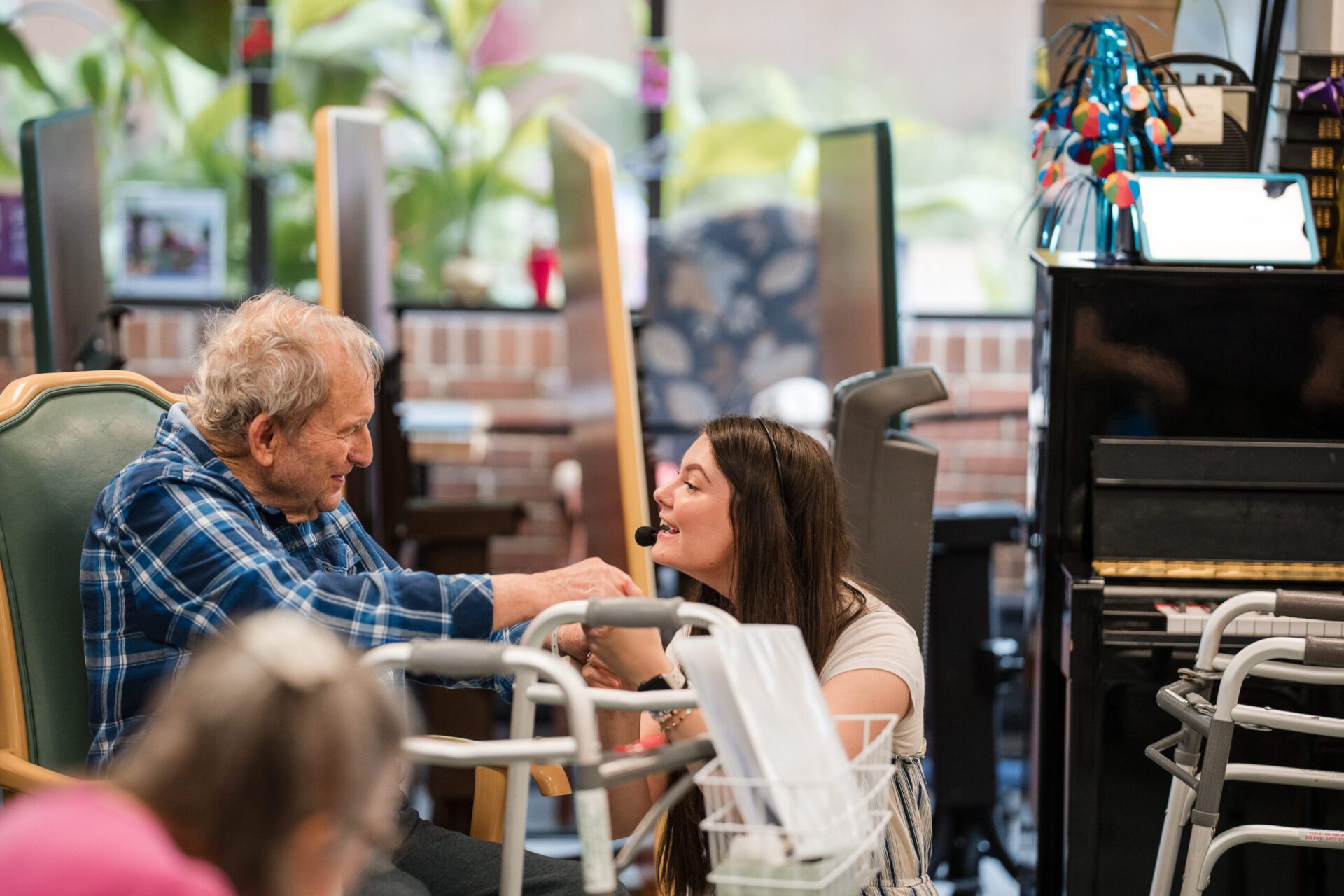Finding the right memory loss support for a loved one with dementia can be challenging. Many families struggle to decide when extra support is needed, where to find it, and how to choose a reputable care provider.
In-home caregivers and adult daycare programs are often a common starting place. But as dementia progresses, caregivers can face burnout and the person living with dementia may have more challenging day-to-day needs.
Here’s how our team members help families decide if it’s time for memory loss support within a senior living community like Living Branches.
Understanding Your Memory Loss Support Options
In-Home Care for Memory Loss Support
It’s natural to want your loved one with dementia to live at home. After all, it’s a familiar and comfortable environment where they may have spent many years.
In-home caregivers can be a good starting place if your loved one:
- Needs help with daily activities but is still relatively independent
- Does not require supervision to prevent leaving the home
- Does not have a sleep pattern that interfere with your ability to rest and recover
- Enjoys a rich social life and activities at their current level of capability
- Is stable day-to-day, and their symptoms or behaviors are not progressing
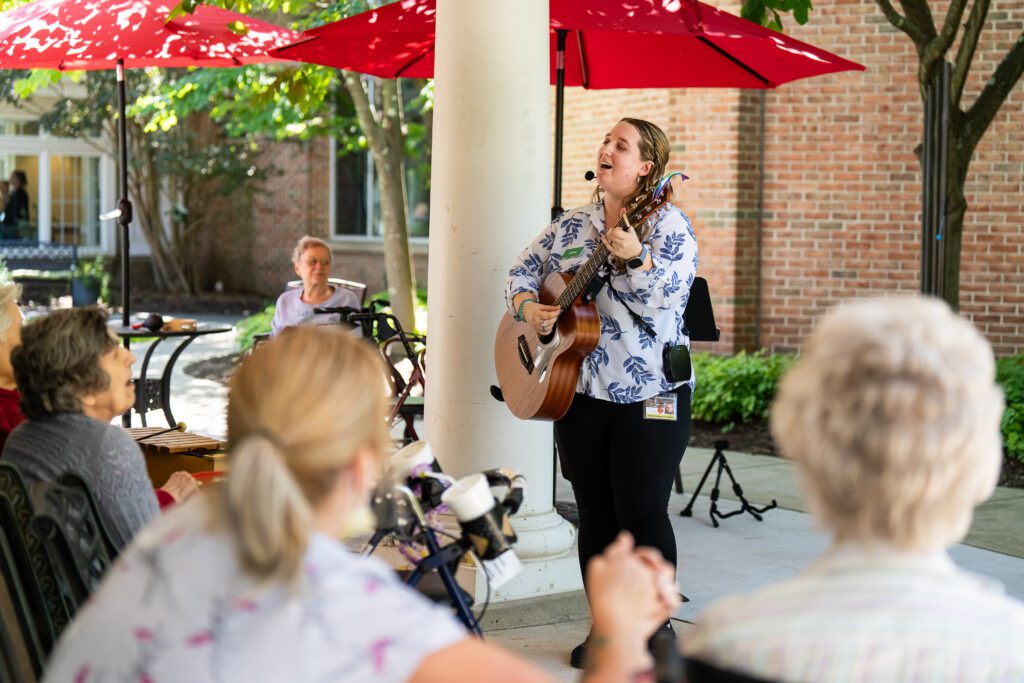
However, in-home caregivers aren’t always the ideal choice. Usually they can’t provide:
- 24/7 care: In-home caregivers are with you during specific hours or shifts, even if they are full-time.
- Adaptations for your home: A home may not be fully secure, increasing the risk of a loved one hurting themselves.
- Special programs: Typically in-home caregivers cannot provide special programs or activities, such as creative arts therapy, fitness activities, or group events.
- Relief for burnout: An in-home caregiver does not take on all the physical and logistical demands of caregiving. In addition, managing a helper’s schedule and finding coverage when they cannot work adds another layer of stress.
- More complex care: If your loved one has chronic physical or behavioral health issues, an in-home caregiver may not have the expertise, equipment, or extra support to address them.
Adult Daycare for Memory Loss Support
Families often turn to an adult daycare to provide memory loss support for a loved one. These community institutions typically operate during regular business hours and offer general support and activities for folks living with dementia.
While adult daycares can be wonderful for socialization and connecting your loved one with peers, these programs also have a few drawbacks:
- Daytime hours: For many people with dementia, the nighttime hours may be equally – if not more – active than daytime, when adult daycares are available.
- Level of care: Adult daycare typically provides general support and activities but may not adapt to each person or use dementia-specific therapies.
- Family involvement: A family member must schedule and transport the person with dementia.
- Moving between locations: Taking a loved one to adult daycare may disrupt their routines and contribute to confusion.
- Inconsistent socialization: Caregivers and other attendees may come and go throughout their time in daycare.
- No future care: As a person’s dementia or other illnesses progress, an adult daycare cannot offer more care, such as skilled nursing.
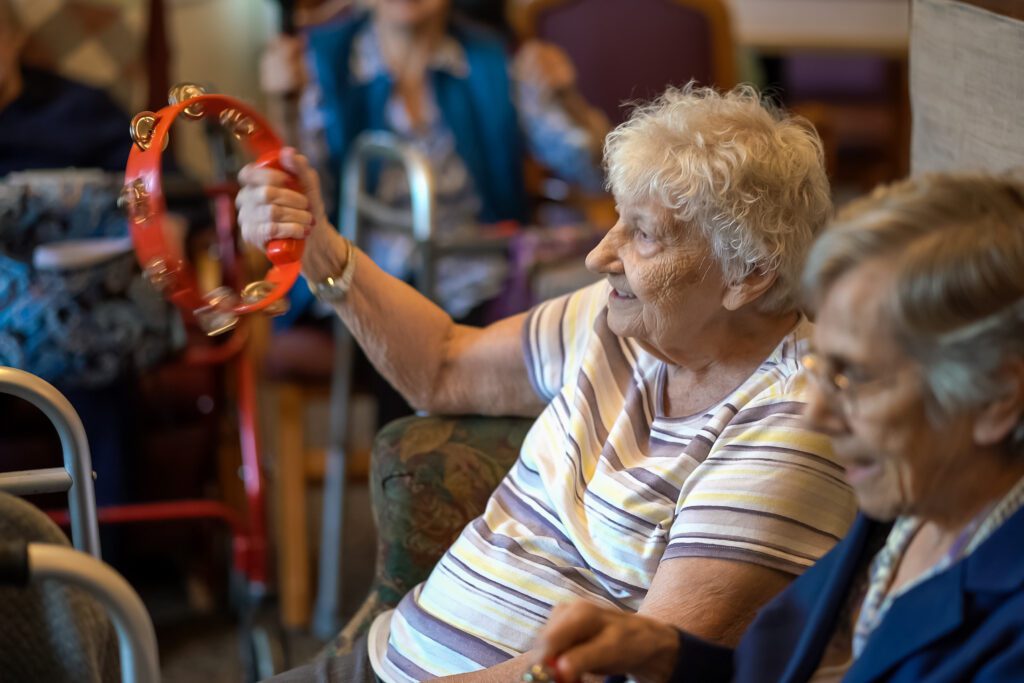
Senior Communities for Moderate or Advanced Memory Loss Support
You have many factors to weigh when considering memory care instead of in-home care or adult daycare for memory loss support. Memory care communities provide a safe, nurturing home for seniors living with memory loss. They typically offer:
- Aides, nurses, and other team members available around the clock
- Psychiatrists, behavioral health specialists, and more
- Help with activities of daily living, like dressing and grooming
- Rooms or apartments in a home-like setting
- Security features to lower the risk of wandering, falls, and other safety concerns
- Housekeeping, laundry services, hair care, and three chef-prepared meals a day
- Activities tailored to the individual’s interests and capabilities
- Opportunities to make friends with peers and caregivers
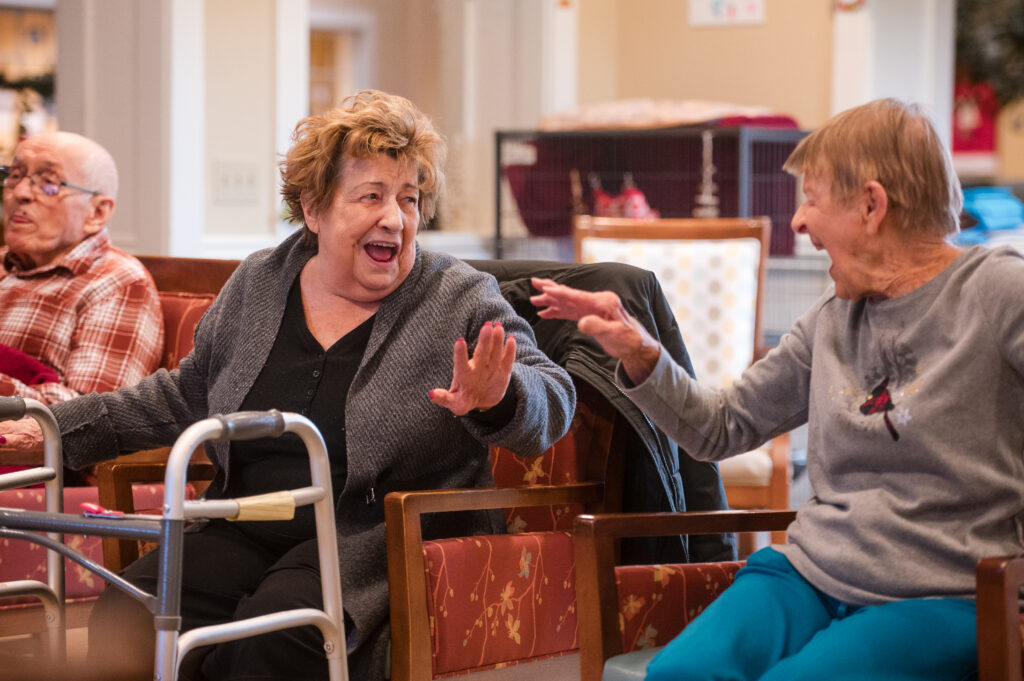
The Benefits of a Senior Community for Long-Term Memory Loss Support
In addition to meeting your loved one’s day-to-day needs, a memory care community can offer memory loss support you won’t find at an adult daycare or at home.
Specialized, Round-the-Clock Memory Loss Support
The professional caregivers in a senior community offer memory loss support around-the-clock. These nurses, aides, and other specialists work in regular shifts. This ensures your loved one is always with someone refreshed and ready to help.
Caregivers are also well trained and experienced. They help with everything from redirecting behavior and reducing agitation to providing medication and help with activities of daily living (ADLs).
Improved Quality of Life
Many family members note their loved one fares much better when they receive memory loss support in a senior living community. With a full team to care for your loved one’s physical, mental, social, and emotional needs, day-to-day life is easier for everyone.
You and your loved one will benefit from:
- A structured routine: No more inconsistency or disruptions in care
- Security: Caregivers are always alert and nearby, and the community is designed to be safer than a typical family home
- Amenities: Delicious food, hair care, fitness activities, recreational spaces, and dozens of fun programs throughout the week
- Therapeutic programs: Creative arts therapy and programs tailored to those who need memory loss support
- Community support: Opportunities to be around other people living with dementia and their loved ones
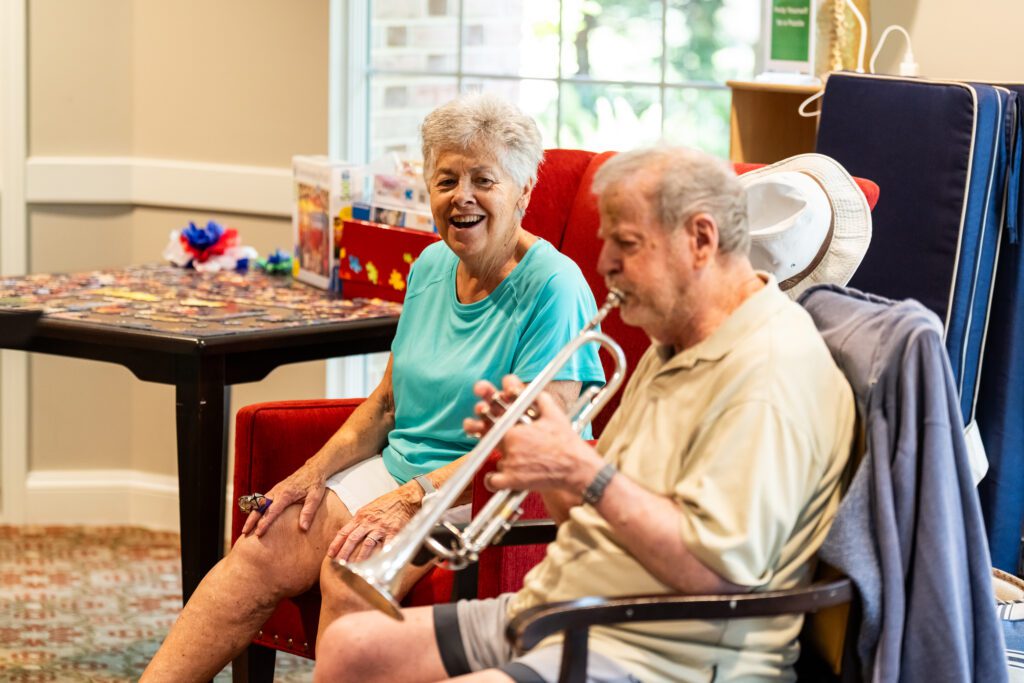
Relief from Providing Memory Loss Support
A memory care community isn’t just for the person living with dementia – it’s for their loved ones, too. The benefits to families are two-fold.
First, most of the day-to-day caregiving is taken off your plate. An entire team is here to provide memory loss support. This allows you to become their spouse, child, or family member once again. No longer are you serving as their primary caregiver – you become a source of joy and connection.
Second, memory care communities offer guidance and help specifically for family members. Many provide one-on-one counseling, support groups, or access to peers who understand your journey.
Deciding What’s Best for Your Loved One’s Memory Loss Support
Choosing between in-home care, adult daycare, and a memory care community is a personal decision for you and your family. Loved ones have many factors to consider when deciding how to provide memory loss support:
- Your loved one’s safety
- Any previous incidents or “near misses”
- Consistency in daily routines and caregivers
- Quality of the care you can provide at home
- Caregiver burnout and its impact on your loved one’s safety
- Future care, including access to skilled nursing care
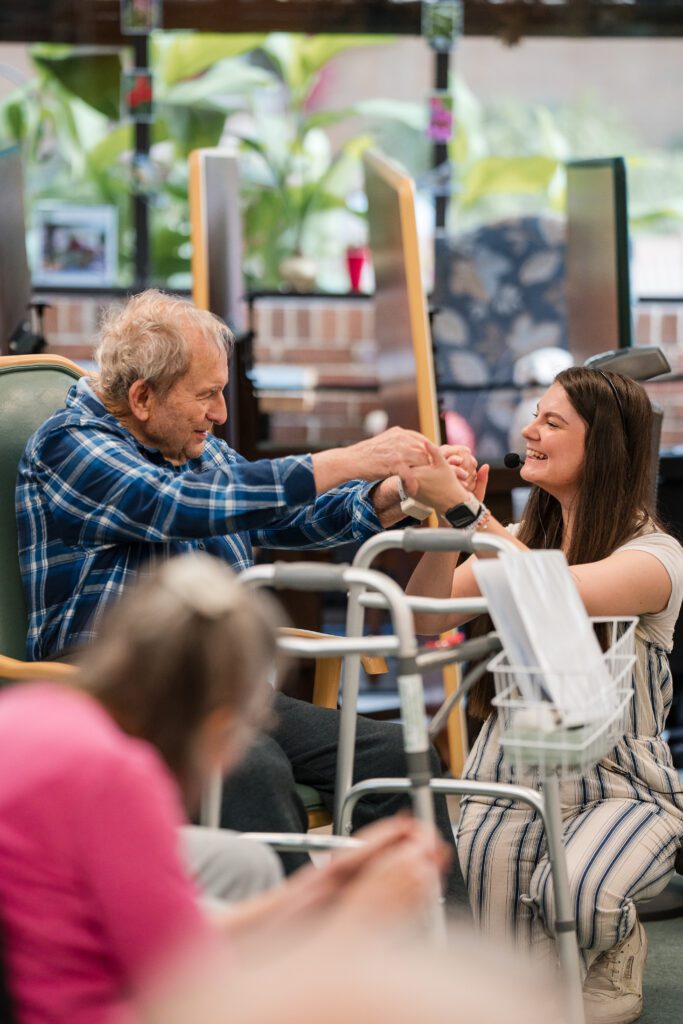
Consider how your loved one living with dementia can live their best life today – and down the road. As dementia progresses, you may want to consider memory care within a Life Plan Community like Living Branches.
Frequently Asked Questions about Memory Loss Support
Memory care communities provide comprehensive memory loss support with 24/7 professional supervision, a structured environment, and specialized programs. Unlike in-home care, these communities offer a safer living environment with secured areas, reduce risks such as wandering, and provide social activities and therapeutic interventions tailored for individuals with dementia.
To decide if memory loss support at a senior living community is right for your family, consider whether your loved one requires continuous supervision, has advanced memory loss, or exhibits challenging behaviors.
Memory care communities offer round-the-clock care and specialized support that adult daycare cannot provide, making them more suitable for extensive memory loss support.
When selecting a memory care community, start by asking about the number of caregivers on-site at any given time, compared to the number of residents. Determine the training, credentials, and expertise of caregivers, ensuring there are nurses on-site and not on call. Ask about the neighborhood’s safety features and amenities. You’ll also want to explore how caregivers ensure residents are engaged throughout the day with activities appropriate for their capabilities.
Memory care communities are typically on par with the cost of round-the-clock memory care in the home and offer the added benefit of a team of caregivers instead of one individual. In-home care also lacks the full range of memory loss support, safety features, and easy access to specialists found in a senior community.
Memory loss support at Living Branches addresses the whole person, not just cognitive or mental health. Residents are paired with more caregivers than the state mandates, including nurses, aides, life enrichment specialists, creative arts therapists, pastors, and more. Living Branches’ Memory Care neighborhoods are sunny, home-like, and designed with comfort in mind.
Memory loss support is available at the Personal Care (assisted living) and Health Care (skilled nursing) levels at Souderton Mennonite Homes in Souderton and Dock Woods in Lansdale.
As a Life Plan Community, Living Branches offers all levels of care across our campuses in Hatfield, Souderton, and Lansdale. Contact one of our sales counselors to learn which community is best for you.

